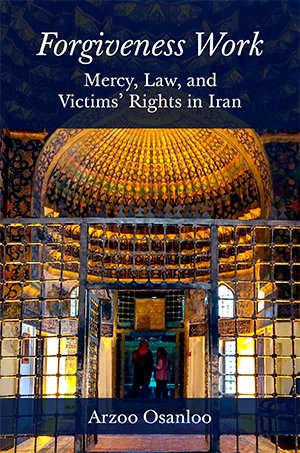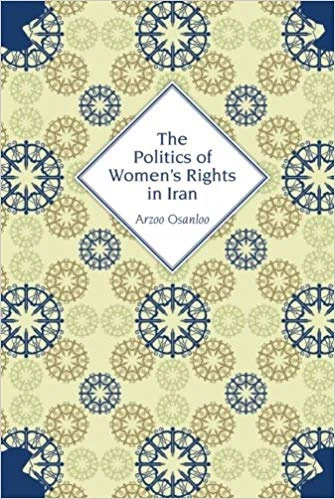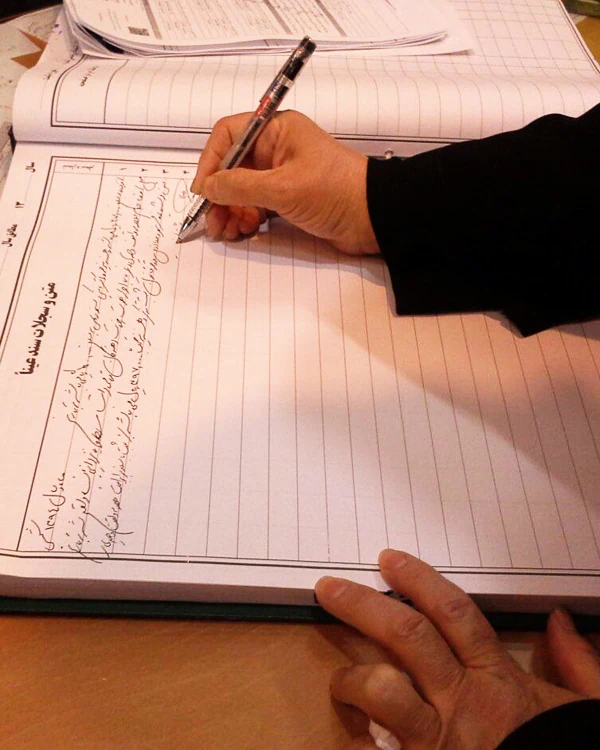Publications

Forgiveness Work: Mercy, Law, and Victims’ Rights in Iran
Iran's criminal courts are notorious for meting out severe sentences—according to Amnesty International, the country has the world’s highest rate of capital punishment per capita. Less known to outside observers, however, is the Iranian criminal code’s recognition of forgiveness, where victims of violent crimes, or the families of murder victims, can request the state to forgo punishing the criminal. Forgiveness Work shows that in the Iranian justice system, forbearance is as much a right of victims as retribution. Drawing on extended interviews and first-hand observations of more than eighty murder trials, Arzoo Osanloo explores why some families of victims forgive perpetrators and how a wide array of individuals contribute to the fraught business of negotiating reconciliation.
Based on Qur'anic principles, Iran's criminal codes encourage mercy and compel judicial officials to help parties reach a settlement. As no formal regulations exist to guide those involved, an informal cottage industry has grown around forgiveness advocacy. Interested parties—including attorneys, judges, social workers, the families of victims and perpetrators, and even performing artists—intervene in cases, drawing from such sources as scripture, ritual, and art to stir feelings of forgiveness. These actors forge new and sometimes conflicting strategies to secure forbearance, and some aim to reform social attitudes and laws on capital punishment.
Forgiveness Work examines how an Islamic victim-centered approach to justice sheds light on the conditions of mercy.

The Politics of Women's Rights in Iran
In The Politics of Women's Rights in Iran, Arzoo Osanloo explores how Iranian women understand their rights. After the 1979 revolution, Iranian leaders transformed the state into an Islamic republic. At that time, the country's leaders used a renewed discourse of women's rights to symbolize a shift away from the excesses of Western liberalism. Osanloo reveals that the postrevolutionary republic blended practices of a liberal republic with Islamic principles of equality. Her ethnographic study illustrates how women's claims of rights emerge from a hybrid discourse that draws on both liberal individualism and Islamic ideals.
Osanloo takes the reader on a journey through numerous sites where rights are being produced—including Qur'anic reading groups, Tehran's family court, and law offices—as she sheds light on the fluid and constructed nature of women's perceptions of rights. In doing so, Osanloo unravels simplistic dichotomies between so-called liberal, universal rights and insular, local culture. The Politics of Women's Rights in Iran casts light on a contemporary non-Western understanding of the meaning behind liberal rights, and raises questions about the misunderstood relationship between modernity and Islam.
“The Law Knows No Shame: On Robert Redfield's 'Primitive Law' and the Persistence of Honor in Contemporary Societies”
American Anthropologist 121(3):729-733.
Read article“On Not Saving the Muslim Women (and Men)”
Journal of Middle East Women's Studies, Special Forum: "Trump's Presidency and Middle East Women's Studies" 13(3): 479-482.
Read article“Framing Rights: Women and Family Law in Pre- and Post-Revolutionary Iran”
New Middle Eastern Studies 5:1-18.
Read article“When Blood Has Spilled: Gender, Honor, and Compensation in Iranian Criminal Sanctioning”
PoLAR: Political and Legal Anthropology Review 35(2): 307–325.
Read article“Whence the Law: Politics of ‘Women's Rights,’ Regime Change and the Vestiges of Reform in the Islamic Republic of Iran”
Radical History Review 101: 42-58.
Read article“The Measure of Mercy: Islamic Justice, Sovereign Power, and Human Rights in Iran”
Cultural Anthropology 21(4): 570-602.
Read article“Islamico-civil ‘rights talk’: women, subjectivity, and law in Iranian family court”
American Ethnologist 33(2): 191-209.
Read article“Doing the ‘Rights’ Thing: Methods and Challenges of Fieldwork in Iran”
Iranian Studies 37(4): 675-684.
Read article“Subjecting the State to Seeing: Charity, Security, and the Dispossessed in Iran's Islamic Republic”
In Governing Gifts: Faith, Charity, and the Security State
(School for Advanced Research Advanced Seminar Series).
E. James, ed., Albuquerque, NM: University of New Mexico Press, 2019. Pp. 59-77.
“Righteous Injuries: Victim's Rights and Offender's Suffering in Iranian Criminal Sanctioning”
In Injury and Injustice: Cultural Practices of Harm and Redress.
A. Bloom, D. Engel, and M. McCann, eds., London: Cambridge University
Press, 2018. Pp. 96-114.
“Evidence, Certainty, and Doubt: Judge's Knowledge in Iranian Criminal Sanctioning”
In Truth, Intentionality and Evidence: Anthropological
Approaches to Crime and Tort.
Yazid Ben-Hounet and Deborah Puccio-Den, eds., London:
Routledge Press, 2017. Pp. 28-45.
“Women and Criminal Law in Post-Khomeini Iran”
In Social Change in Post-Khomeini Iran.
Mahmood Monshipouri, ed., London: Hurst Publishers, 2016. Pp. 91-112.
“Crime and Reconciliation: Women's Peace Initiatives in the Islamic Republic of Iran”
In Women and Peace in the Islamic World:
Gender, Agency and Influence.
Yasmin Saikia and Chad Haines, eds. London: I.B. Tauris, 2014. Pp. 224-245.
“Les pratiques sociales et légales du pardon dans le système judiciaire iranien”
In Justice, Religion, Réconciliation.
Yazid Ben Hounet, Sandrine Lefranc & Deborah Puccio-Den, eds.
Paris: Editions L'Harmattan. Collection « La religion en question », 2014. Pp. 83-94.
“Khomeini's Legacy on Women's Rights and Roles in the Islamic Republic of Iran”
In A Critical Introduction to Khomeini.
Arshin Adib-Moghaddam, ed. Cambridge: Cambridge University
Press, 2014. Pp. 239-255.
“From Status to Rights: The Shifting Dimensions of Women's Affairs and Family Law in Iran”
In Feminist Activism, Women's Rights and Legal Reform.
Mulki Al-Sharmani, ed. London: ZED Books, 2014. Pp. 125-150.
“Human Rights by Any Other Name”
In Iran Confronting 21st Century Challenges: In Honour
of Mohammad-Reza Djalili.
H.E. Chehabi, Farhad Khosrowkhavar, and Clement Therme, eds., Los Angeles,
CA: Mazda, 2013. Pp. 79-95.
“Contesting Governance: Authority, Protest, and Rights Talk in Post-Republican Iran”
In Comparative Authoritarianisms: Syria and Iran.
Steven Heydemann and Reinoud Leenders, eds. Stanford, CA: Stanford University
Press, 2012. Pp. 127-142.
“What a focus on ‘family’ means in the Islamic Republic of Iran”
In Family Law in Islam: Divorce, Marriage
and Women in the Muslim World.
Maaike Voorhoeve, ed., London: I.B. Tauris, 2012. Pp. 51-76.
“Iran”
In Case Studies in Comparative Politics.
David J. Samuels, ed. New York: Pearson Press, 2012. Pp. 407-447.
“Khoon Reekht: Tahleelee Jensi az Kayfar va Mojazaat dar Iran”
(Blood Has Spilled: A Gendered Analysis of Crime and Punishment in Iran) S. Shahshahani, trans. Farhang va Ensan (Culture and Being), Tehran, Iran, 5(2): 103-122.
“Refusing Mercy: The Hunger Strike Controversy as a Challenge to the State's Monopoly on Violence in Iran”
In Policing and Prisons in the Middle East.
Laleh Khalili and Jillian Schwedler, eds. New York: Columbia University
Press, 2010. Pp. 263-277.
“Lessons from the Suffrage Movement in Iran”
In Yale Law Journal - Forum on 100th Anniversary
of Women's Suffrage – the 19th Amendment.
Volume 129: 496-511, January 20, 2020.
“Redress: Rights and Other Remedies, A Comment on David Engel's Article on Rights Consciousness”
Indiana Journal of Global Legal Studies 19 (2): 495-505.
Read article“Courts”
In International Encyclopedia of Anthropology: Anthropology Beyond Text.
Hilary Callan, ed., London: John Wiley & Sons Ltd., 2018.
Islam and the Rule of Justice: Image and Reality in Muslim Law and Culture.
Chicago: University of Chicago Press, 2018, Anthropology Quarterly, 92(3): 955-961.
Read essayChina and Islam: The Prophet, the Party, and the Law.
Cambridge: Cambridge University Press, 2016, Law and Society Review, 52(3):816-820.
Read essayProzak Diaries: Psychiatry and Generational Memory in Iran.
Stanford: Stanford University Press, 2016, Iranian Studies.
Read essayWomen in the Mosque: A History of Legal Thought and Social Practice.
New York: Columbia University Press, 2014, Journal of the Society for Contemporary Thought and Islamicate World.
Read essay“Improving the Status of Women: An Interview with Arzoo Osanloo”
Tarikh Irani (Iranian History) Journal.
Read“Methods as Politics and the Anthropology of Change in Iran”
American Anthropologist, Vol.120(1): 150-51.
Read“Presidential Executive Order 13769: Protecting the Nation From Foreign Terrorist Entry Into the United States”
Middle East Center, University of Washington.
“Forbearance Advocacy and Criminal Sanctioning in Iran”
The Foreign Policy Centre, Iran Human Rights Review, Women and Human Rights.
Read“Postscript to ‘When Blood Has Spilled: Gender, Honor, and Compensation in Iranian Criminal Sanctioning’”
Political and Legal Anthropology Review Online.
Read“Interview with Arzoo Osanloo about ‘The Measure of Mercy.’”
Curated Collections, Cultural Anthropology Online.
ReadZannegaar
Zannegaar Online Journal, Issue 11, "Law, Culture, and Gender," (in English and Persian).
About
